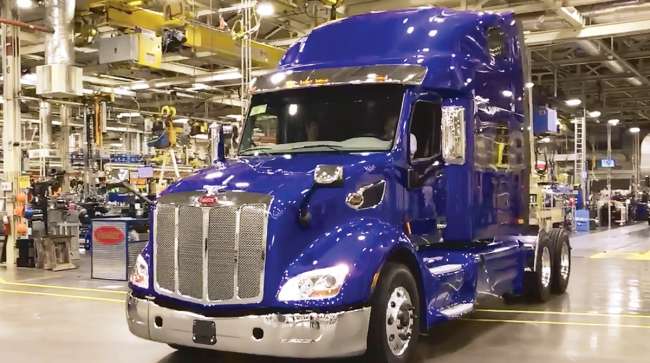Senior Reporter
Class 8 Sales Tumble in January as Fleets Grow More Cautious

[Stay on top of transportation news: Get TTNews in your inbox.]
Class 8 U.S. retail sales in January dropped below 16,000 for the first time since January 2018, WardsAuto.com reported, as a cautious industry waited to see what changes in the freight environment.
Sales fell 22.5% to 15,645. That compared with a year earlier when they were 20,192 — and set the table for what became the best sales year since 2006.
One fleet executive said January’s numbers, while low, reflected the cyclical nature of the trucking industry. U.S. replacement volume is accepted to be 16,700 units a month.

Larson
“Trucks don’t generate the product, they deliver the product. Right now, it is a waiting period for things to pick up. Once that does happen, which it will, you are going to see truck sales pick up because the freight is going to be there,” said Riley Larson, general manager of JMS Transportation Inc.
The Cedar Rapids, Iowa-based carrier has 60 company trucks as well as 90 owner-operators. It typically does shorthaul regional distribution of 250 to 300 miles with
dry vans.
All truck makers saw sales drop year over year, except for Peterbilt Motors Co. Peterbilt, a unit of Paccar Inc., posted an 8.1% increase on sales of 2,669, earning a 17.1% market share.

Feight
“The vocational market is doing really well throughout U.S. and Canada,” Paccar CEO Preston Feight said during the company’s latest earnings call.
Kenworth Truck Co., also a Paccar brand, had a 13.3% market share on sales of 2,078, down 8.6% from 2,273 a year earlier.
Freightliner, a unit of Daimler Trucks North America, retained its leading position with a market share of 38.7% — despite seeing sales fall 34.2% to 6,060 from 9,205 a year earlier.
Western Star, also a unit of DTNA, had 441 sales, or 38 fewer compared with a year earlier, and earned a 2.8% share.
JMS Transportation, primarily a Freightliner customer, bought two trucks in January.
“We have plans for growth for the rest of the year. We would like to expand a little bit,” Larson said. “But we are going to do it the right way and make sure we have some contracted freight secured before we purchase additional equipment.”
One industry analyst said the market is stabilizing, but not yet recovering because there is nothing pushing the industry ahead.
“I expected the number to be a little lower. So this is, to me, above expectations,” said Don Ake, vice president, commercial vehicles for FTR.
Ake also described fleets as cautious, but not fearful.
One fleet executive said the next few weeks is really when things will become a lot more clear.

Leathers
“We think assets are going to matter again, and they’re going to matter again very soon,” Werner Enterprises CEO Derek Leathers said in a recent earnings call.
Leathers said Werner has seen some strength in the overall nonsurge network.
Meanwhile, the first quarter is historically a little slow for the industry, said Steve Gilligan, Navistar Inc.’s vice president of product and vocational marketing for North America.
International earned a 12.4% market share with 1,939 sales, down 38.4% from 3,150 a year earlier. International is a unit of Navistar.
“We think it’s going to be better for us going into February, March and April, which is our fiscal-year second quarter,” Gilligan said. “The severe-duty segment of Class 8 is holding up well.”

Class 8 trucks on a lot in Clarksville, Ind. (John Sommers II for Transport Topics)
Volvo Trucks North America posted sales of 1,468, good for a 9.4% share but down 8.1% from 1,597 sold a year earlier.
“The overall dealer inventory level needs to come down before we will see the total market come back again,” said Magnus Koeck, vice president of marketing for VTNA, a unit of Volvo Group.
Mack Trucks, also a unit of Volvo Group, had a 6.2% share with 977 sales, down 4.1% from 1,019 sold a year earlier.
“We anticipate a steady year as customers continue to look to boost their bottom lines with the uptime, durability and fuel efficiency our products deliver,” said Jonathan Randall, Mack Trucks’ senior vice president of North American sales.
In part two of a two-part exploration of autonomous technology today, our latest RoadSigns podcast revisits conversations with Chuck Price of TuSimple and Ognen Stojanovski of Pronto.ai. Hear them discuss a palatable Level 2 version of trucking autonomy. Listen to a snippet above, and to hear the full episode, go to RoadSigns.TTNews.com.
One fleet embodied the overall industry’s caution.
USA Truck recently lowered the average age of its fleet to about 2.7 years from 3.3 years. “We have been making investments,” Chief Financial Officer Jason Bates said during a recent earnings call.
“If we need to pull back on that this year, if the market takes longer to recover than we would like, we will absolutely do that,” he said. “And we have the flexibility to do that.”
Bates said the truckload carrier also needs to make the right long-term decisions.
“We don’t want to make shortsighted decisions just to prop up the current [earnings] period,” he said.
Want more news? Listen to today's daily briefing:





